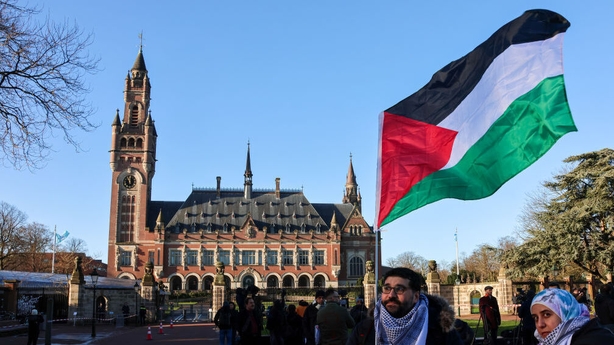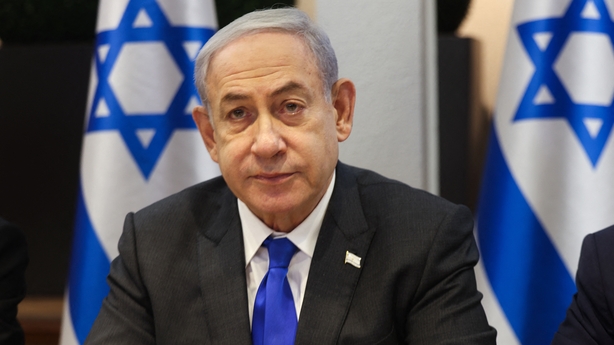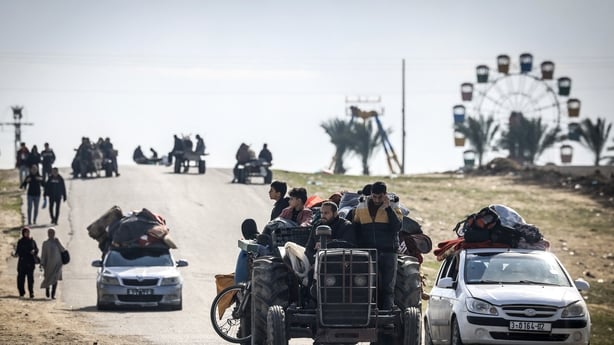The UN's top court has ordered Israel to prevent acts of genocide against the Palestinians and do more to help civilians, although it stopped short of ordering a ceasefire as requested by South Africa.
South Africa brought the case to the International Court of Justice (ICJ) earlier this month, asking it to grant emergency measures to halt the fighting, which has killed more than 26,000 Palestinians.
It accused Israel of state-led genocide in its offensive, begun after Hamas militants crossed the border into Israel killing 1,200 and kidnapping more than 240.
Israel sought to have the case thrown out.
In the ruling, the judges said Israel must take all measures within its power to prevent its troops from committing genocide, punish and must take steps to improve the humanitarian situation.
While the ICJ did not order a ceasefire, it said it would not throw out the genocide case, ruling that the Palestinians appeared to be a protected group under the 1948 Genocide Convention.

It did not decide the merits of the genocide allegations. Israel has called South Africa's allegations false and "grossly distorted", and said it makes the utmost efforts to avoid civilian casualties.
The South African government welcomed the provisional measures ordered by the ICJ against Israel.
"Today marks a decisive victory for international rule of law and a significant milestone in search of justice for Palestinian people," they said.
The Palestinian foreign ministry also welcomed the order from the ICJ saying it was an "important reminder no state is above the law."
Speaking after the ruling, Israeli Prime Minister Benjamin Netanyahu said the charge "is not only false, it's outrageous, and decent people everywhere should reject it".
Israel "does not need to be lectured on morality," his Defence Minister Yoav Gallant said.
The ICJ decision is an important development that contributes to isolating Israel and exposing its crimes in Gaza, senior Hamas official Sami Abu Zuhri told Reuters in the wake of the ruling.
"We call for forcing the occupation to implement the court's decisions," he added.
Meanwhile, Israel's far-right national security minister, Itamar Ben-Gvir, appeared to mock the Court's ruling.
Commenting on the social media platform X, formerly known as Twitter, he said: "Hague, Shmague."
The European Union said it wanted immediate implementation of the court's decision.
In a keenly watched decision, the 17 judges of the court were to declare whether or not South Africa has demonstrated that the charge against Israel of genocide is plausible, and whether the court can therefore order Israel to take specific measures, including halting its bombing campaign and ground operation completely while the wider case continues.

The hugely significant case will have far-reaching ramifications for Israel's war in Gaza, for the Palestinian population there, and for the International Court of Justice itself.
South Africa alleged that Israel's bombardment of Gaza, its denial of basic humanitarian relief, and the specific remarks by Israeli politicians and military figures about the Palestinians, are all evidence of an intent to destroy or uproot some or all of the Palestinian population - in other words an act or acts of genocide.
Israel in turn has accused South Africa of giving legal cover to Hamas, which carried out the 7 October attacks and which, Israel says, is the real perpetrator of genocide, given its aim of destroying Israel.
The court will not however pass judgement on whether or not Israel is actually committing genocide in Gaza as part of the case.
We need your consent to load this rte-player contentWe use rte-player to manage extra content that can set cookies on your device and collect data about your activity. Please review their details and accept them to load the content.Manage Preferences
At this stage, the ICJ will hand down emergency orders before considering the wider accusation of genocidal acts in Gaza - a process that will likely take years.
The case has been brought by South Africa, which says that Israel is in breach of the 1948 UN Genocide Convention, set up in the ashes of World War II and the Holocaust.
"South Africa does not need to prove that Israel is committing genocide," said Juliette McIntyre, international law expert from the University of South Australia.
"They simply need to establish that there is a plausible risk of genocide occurring," she said.
Read more:
South Africa's genocide case against Israel explained
Explained: Ireland's position on the genocide case against Israel
Over two days of hearings earlier this month in the gilded halls of the Peace Palace in the Hague, a world away from the violence in Israel and Gaza, lawyers argued over the technicalities of the Genocide Convention.
"Genocides are never declared in advance," declared Adila Hassim, a top lawyer for South Africa.
"But this Court has the benefit of the past 13 weeks of evidence that shows incontrovertibly a pattern of conduct and related intention that justifies a plausible claim of genocidal acts," she added.
The case has sparked fury in Israel, with Prime Minister Benjamin Netanyahu declaring that "the world is upside down".
Israel's lawyer Tal Becker dismissed Pretoria's case as a "profoundly distorted factual and legal picture" and a "decontextualised and manipulative description of the reality" on the ground.
Showing the court images of the brutal Hamas attack, Mr Becker said that "if there have been acts that may be characterised as genocidal, then they have been perpetrated against Israel".
Mr Becker denied that Israel's operations were aimed at the citizens of Gaza. The army's aim was "not to destroy a people, but to protect a people, its people, who are under attack on multiple fronts", he said.

The ICJ's rulings are binding on all parties, but it has no mechanism to enforce them. Sometimes they are completely ignored - the court has ordered Russia to stop its invasion of Ukraine for example.
Mr Netanyahu has already suggested he does not feel bound by the court, saying "no one will stop us - not The Hague, not the Axis of Evil and no one else".
"It is conceivable that an order by the court would not have any significant influence on Israel's military operation," said Cecily Rose, assistant professor of public international law at Leiden University.
In its submission to the court, South Africa acknowledged the "particular weight of responsibility" of accusing Israel of genocide but said it was bound to uphold its duties under the Convention.
Israeli lawyer Becker retorted that "there can hardly be a charge more false and more malevolent than the allegation against Israel of genocide".
The 7 October Hamas attack resulted in the death of around 1,140 people in Israel, most of them civilians, according to an AFP tally based on official Israeli figures.
At least 25,700 Palestinians, around 70% of them women, young children and adolescents, have been killed in Gaza in Israeli bombardments and ground offensive since then, according to the Hamas government's health ministry.
